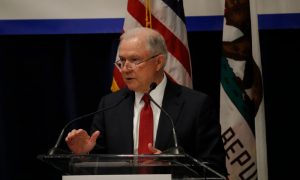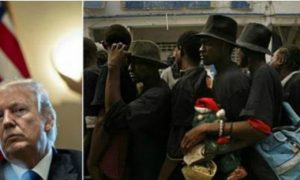Anthony Sullivan and Richard Adams were spending a quiet evening watching television in their Tujunga home when Johnny Carson joked about some liberal county clerk in Colorado who had done the unthinkable: issued a marriage license to two men.
It was 1975. Adams and Sullivan had been together for four years and knew they would stay together. They hopped a flight to Boulder, witnesses in tow,were granted Colorado Marriage License No. 1860 and got married.
“When we came home from the wedding, Richard bent down to put the key in the door of our place, and I just remember looking at him and having never felt such love as I did at that moment,” Sullivan recalled. “I thought, ‘This dear, sweet, wonderful man has gone out on this tremendous limb for me.’ I just remember feeling completely full.”
But that newlywed joy, as they expected, was quickly tempered by a world that wasn’t ready for them.
Shortly after they married, Adams filed a petition with the Los Angeles office of the U.S. Immigration and Naturalization Service (as it was then called) seeking permanent residency for Sullivan, an Australian citizen. For heterosexual married couples, the request was routine.
The agency, on official letterhead, responded with one sentence: “You have failed to establish that a bona fide marital relationship can exist between two faggots.”
A year ago, the Supreme Court struck down a key part of the federal Defense of Marriage Act, making legally married gay couples eligible for green cards. But Sullivan is still fighting an old battle because his marriage — one of the first legal same-sex marriages in the country — pre-dated the abolishment of DOMA.
Sullivan is 72 now, with a soft voice and shy smile. His beloved Adams died in December 2012, just months before the Supreme Court’s rulings on gay marriage.
This spring, Sullivan asked Los Angeles immigration authorities to reopen Adams’ petition so he can be granted residency as the surviving spouse of a U.S. citizen.
He’s decided to continue to push for his green card for a simple reason:
“The story’s not complete.”
They met by accident.
Sullivan was in the U.S. on a visitor visa in May 1971 when he stopped at a Sunset Boulevard bar called The Closet. He mistook Adams for someone else and rushed up to him, thinking he was a friend from London. Sullivan quickly realized his mistake but was too polite to admit it and walk away.
“We got to talking,” he said, “and I discovered in that conversation someone who was a very rare person indeed.”
They fell in love fast.
“It was a day and age in which anything was possible,” Sullivan recalled. Martin Luther King Jr. and Rosa Parks had shaken the country’s consciousness during the civil rights movement; Cesar Chavez had led the grape boycotts in California. Young people were protesting the war in Vietnam.
“We really felt at that point in time that people could achieve the world they wanted and the life they wanted,” he said. “If two men were in love, why shouldn’t they be able to stay together?
Still, they didn’t take marriage lightly.
“We knew that if we took a stand, we would be coming up against a government,” Sullivan said. “It was no small thing.”
Boulder County Clerk Clela Rorex issued marriage licenses to six gay couples, including Sullivan and Adams, in the spring of 1975 after the Boulder County district attorney’s office advised her that nothing in state law explicitly prohibited it.
After getting their marriage license from Rorex, Sullivan and Adams exchanged vows in the First Unitarian Church of Denver.
The marriages garnered headlines nationwide, including: “He Marries Lover … Another Man” and “Is the Country Ready to Accept a Male Bride?” One man, in protest, took a horse named Dolly to the Boulder County clerk’s office and applied for a marriage license. The clerk retorted that the horse was only 8 years old and could not prove parental consent.
Rorex issued the licenses for about two months, and “all hell broke loose, of course,” she said in an interview. She stopped issuing the licenses and soon afterward resigned. The six marriages were never legally voided, and “people just thought they would go away,” she said.
Rorex, then 31 and a self-described new feminist, had been in the elected office for only three months before the first gay couple came to her seeking a license.
“To me, it was simply, here’s someone else who’s marginalized,” she said.
Boulder made headlines again last week when County Clerk Hillary Hall issued licenses to several same-sex couples in the wake of a federal appeals court ruling on gay marriage. Hill issued the licenses despite the court immediately issuing a stay — and despite a warning from the state attorney general that the licenses were invalid.
Although he and Adams always planned to stay together, Sullivan said, they hoped the marriage would be able to guarantee that he wouldn’t be deported. His visitor visa, issued in 1971 by the U.S. Consulate in Perth, Australia, expired in March 1975, said his attorney, Lavi Soloway.
When they received the derogatory letter from the INS denying the green card, Sullivan was shocked. “I thought the American government had more dignity,” he said.
But Adams was hurt. Born in Manila, he immigrated to the U.S. when he was a child and became a naturalized citizen.
“He had great belief in his country,” Sullivan said of Adams. “He believed in social progress and in his civic duty. He religiously voted…. [The letter] profoundly affected him.”
The couple sued the INS, challenging the constitutionality of the denial. It was the first federal lawsuit demanding recognition of a same-sex marriage. A federal judge in Los Angeles upheld the denial, and, after years of litigation, the couple lost subsequent appeals.
Australia had already rejected Adams’ request for residency. The Times, in a 1984 headline, called them “Men Without a Country.”
Facing deportation in 1980, Sullivan asked federal officials that he not be sent out of the country because being away from Adams would constitute an “extreme hardship.” In response, the Department of Justice’s Board of Immigration Appeals wrote: “We do not find that the respondent’s separation from his ‘life partner’ will cause him hardship, emotional or otherwise, sufficient to rise to the level of extreme hardship.”
After losing that case, the couple spent a brief time in Europe before coming back to Los Angeles. They lived quietly in Hollywood to avoid drawing the attention of immigration officials but, in the last few years of Adams’ life, began appearing at rallies supporting gay marriage.
Sullivan, in immigration limbo, missed his mother’s and brother’s funerals in Australia.
“Whilst there are all these terrible things that have happened,” he said, “on a personal level, it’s all been very rewarding.”
Sullivan filed his request to have the green card petition reconsidered at the Los Angeles field office of U.S. Citizenship and Immigration Services on April 21 — what would have been his and Adams’ 39th wedding anniversary.
It was the same downtown building where they had applied for a green card in 1975.
Since then, Sullivan had avoided driving down that part of North Los Angeles Street because it was too painful. Asked how he was treated during their initial trip to the office, he replied softly: “Ugliness. Ugliness. I just want to leave it at that.” Soloway, his attorney, said that by continuing to push for a green card, Sullivan is “giving the agency the opportunity to right a historical wrong.”
Claire Nicholson, a spokeswoman for the agency, said she could not comment on Sullivan’s current case “because of privacy laws.”
Hiroshi Motomura, an immigration law professor at UCLA, said widowers’ petitions for green cards are common and that people have up to two years after a spouse’s death to file a petition.
Motomura has taught Sullivan and Adams’ case in his class for years, calling it an “unusual, pioneering case” that brought same-sex marriage into the public consciousness. A documentary about their marriage, “Limited Partnership,” premiered at the Los Angeles Film Festival last month.
“The world has developed alongside the case,” Motomura said. “Now, it’s a case for the way people used to think.”
A few days before Adams died of a brief illness, the Supreme Court announced that it would take up the case challenging the Defense of Marriage Act. Sullivan said Adams died knowing that, soon, a decision on marriages like theirs would be made.
“When my time comes to go,” Sullivan said, “I can think I’ve been made a good accounting of our lives because Richard and I fell in love — and our love, because it was honest, it was romantic and pure and all that, our lives contributed to the freedom of other people who love each other.”
Source: LA Times
[AdSense-A]















































































































































































































































![[Video] Chicago Police Officers Caught On Video Telling Two Black Men "We Kill Mother F**kers"](https://earhustle411.com/wp-content/uploads/2018/07/evil-cop-3-300x180.jpg)
![[Video] Chicago Police Officers Caught On Video Telling Two Black Men "We Kill Mother F**kers"](https://earhustle411.com/wp-content/uploads/2018/07/evil-cop-3-80x80.jpg)












![[Video] White Woman Calls The Cops On Black Real Estate Investor, Cops Threaten To Arrest Her For Harassing Him](https://earhustle411.com/wp-content/uploads/2018/05/nosy-neighbor-300x180.png)
![[Video] White Woman Calls The Cops On Black Real Estate Investor, Cops Threaten To Arrest Her For Harassing Him](https://earhustle411.com/wp-content/uploads/2018/05/nosy-neighbor-80x80.png)


![White Scientist Says The Black Community Is Being Targeted By The Medical System, They Are Deliberatly Being Poisoned [Video]](https://earhustle411.com/wp-content/uploads/2016/05/mike-adams-300x180.jpg)
![White Scientist Says The Black Community Is Being Targeted By The Medical System, They Are Deliberatly Being Poisoned [Video]](https://earhustle411.com/wp-content/uploads/2016/05/mike-adams-80x80.jpg)








![Teenage Girl Shot In Her Stomach Three Times But Took Time To Post To Facebook [ Video]](https://earhustle411.com/wp-content/uploads/2016/02/Gangster-chick-300x180.jpg)
![Teenage Girl Shot In Her Stomach Three Times But Took Time To Post To Facebook [ Video]](https://earhustle411.com/wp-content/uploads/2016/02/Gangster-chick-80x80.jpg)







